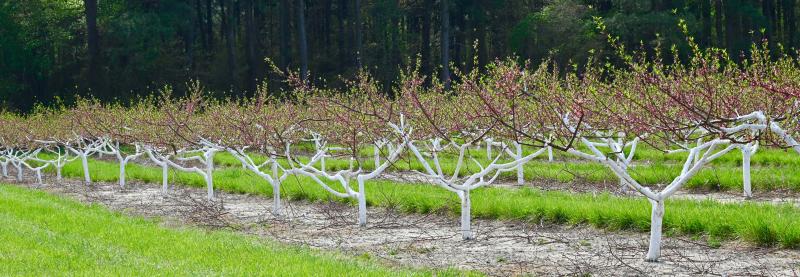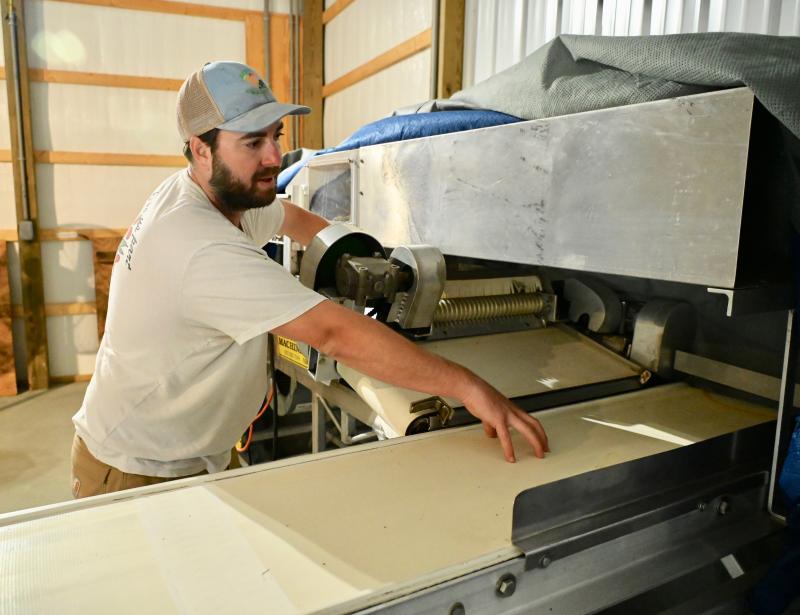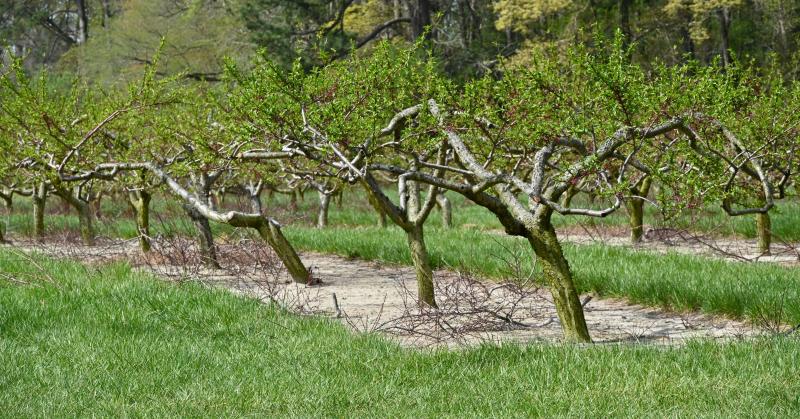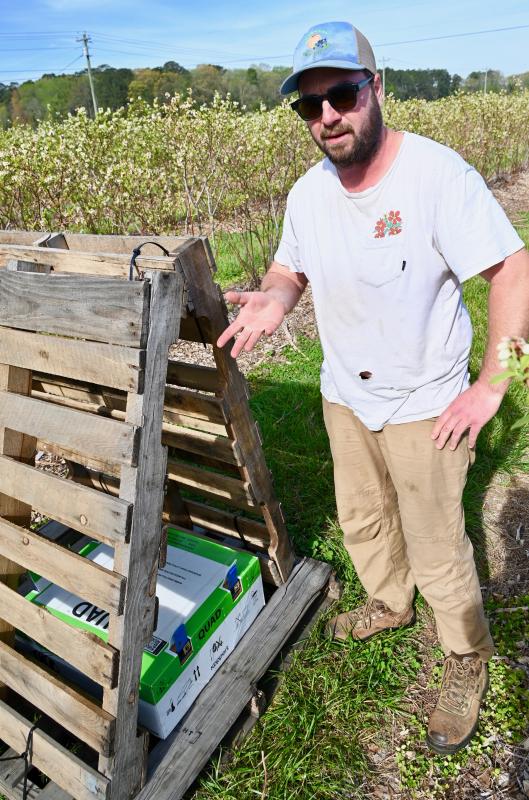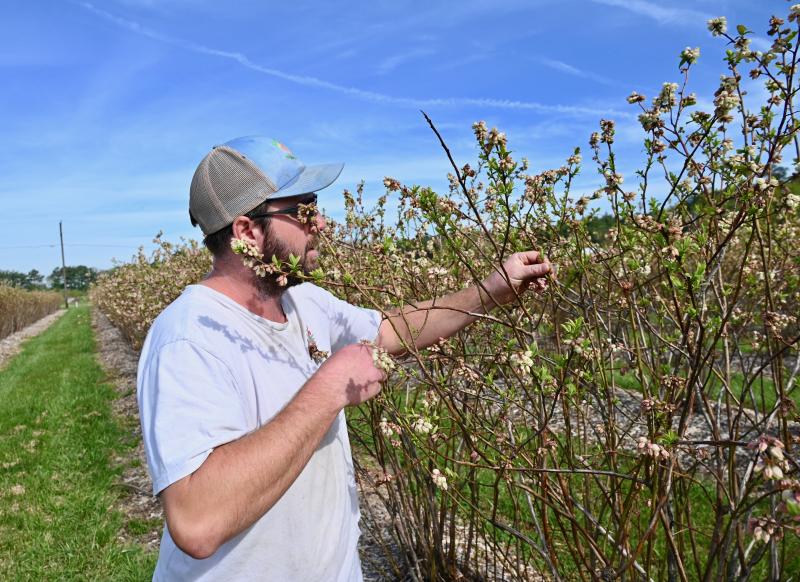This time of year, the Bennetts are spending a lot of time out in their 50-acre peach orchard opening up blossoms to reveal little peaches about the size of a match head. If those are just the right color, they know the crop is growing properly.
From all indications, this year should be a good one.
For decades in the late 1800s and into the 1900s, Sussex County was known as the Peach Capital. An entire industry grew up around the crop, and there were more than 800,000 peach trees in the county. It's no wonder the state flower is the peach blossom.
The county's peach crop was wiped out near the turn of the 20th century by the peach yellows virus. Nearly every orchard was destroyed, and farmers moved on to other crops, including strawberries.
No idea how much work
Bennett Orchards on Route 20 is one the few remaining peach orchards in the county and state. It offers you-pick blueberries and peaches, and sells the fruit at eight area farmers markets.
While people look forward to the Bennetts’ blueberries and peaches each summer, they have no idea how much work goes on behind the scenes to get those fresh fruits to local markets.
The orchard is operated by brothers Henry and Hail Bennett, and their father Jim. Both brothers, sixth-generation farmers, are Indian River High School graduates who returned to the family farm after graduating from college.
It was Hail who planted the farm's first acres of blueberries in 2011, and it was Henry who started selling their fruit at farmers markets.
A lot of science goes into growing peaches. It's a labor-intensive endeavor, and the fate of each crop is tied to the weather and temperatures.
When peaches start to bloom in early spring, any dip in temperature below 28 degrees for an extended period of time can mean disaster, Henry said.
For two years, 1989 and 1990, the entire crop was destroyed by an unusually cold spring. In 2016, only 30% of the crop was salvageable and last year, only 50% survived a cold blast in April.
Just the right amount of water is also crucial. The farm has more than 20 miles of underground tubing to control how much each tree and each blueberry bush receives.
Among the Bennetts’ 20 yellow peach varieties are high-chill types suited for the Mid-Atlantic region. They also grow one variety of white peaches and one variety of nectarines.
“Ideally, we want the temperature to remain above 28 degrees with not too much rain. Those conditions provide the optimum sugar content for peaches,” Henry said.
The Bennetts have fine-tuned the yellow and white peach varieties they grow so the season lasts from July 4 to Labor Day. They harvest three varieties in early July, five in mid- to late July, three in early August, and five varieties of peaches and one of nectarines in mid- to late August.
Their 10 acres and six varieties of blueberries are usually ready to pick in early June, with the season lasting less than two months.
About the orchard
Many of the orchard's newer trees have white-painted trunks that help deflect heat. New trees have to be planted to replace old trees, keeping in mind that it takes three years before a tree produces peaches.
Jim and his wife Carrie planted the first 25 acres of peach trees in 1980 and operated the area's first you-pick operation starting in 1987.
There are plenty of honey bees and bumblebees flying around the Bennett farm, but they are there not to pollinate the peach trees, but the blueberry bushes. Most peach trees are self-pollinating.
In a good year, each peach tree actually has too many peaches, Henry said. When blossoms start to appear, about 20% are removed by pulling a rope along the tree rows. About 50 peaches are picked from each tree during the season that runs from July 4 to Labor Day. Another major job this time of year is thinning the peach trees’ branches.
Henry said it's best to pick peaches and blueberries by hand. When some varieties of peaches are ripe around the first week in July, market sales begin. Henry said to get fresh peaches to the Historic Lewes Farmers Market each Saturday, it's all hands on deck to start picking at 4:45 a.m. “We want what we pick to be sold within 24 hours,” he said.
Until the last basket
As if the weather is not enough to contend with, the Bennetts were forced to install deer fencing around their farm this year. “Deer were rubbing their heads against the trees and bending them over,” Henry said.
So when can the Bennetts relax? “We never stop worrying until the last basket of the season is picked,” Henry said.
Even in the midst of summer, the weather can impact the orchard. On Aug. 5, 2020, at the peak of the season, a tropical storm with lots of rain was predicted. “We were able to pick 350-400 baskets before the storm hit,” he said.
Long Sussex roots
The family has long roots in Sussex County, with the sixth generation now working on the farm. Jim Bennett is proud to point out that his grandfather, Asa Bennett, was among the first chicken broiler farmers in the county.
Cecile Steele of Ocean View typically gets the historical credit for the birth of the poultry industry in the state, but he said his grandfather was raising and selling chickens before she was.
The farmhouse on the property dates back to the 1850s when the area was known as Baltimore Mills, and included a water-powered grist mill and sawmill. The Bennetts started farming the land in 1867, and for decades, they grew grain and raised chickens.
Hail and his wife Ashley now live on the family farm with their daughter Violet, who is the seventh generation to reside there.

